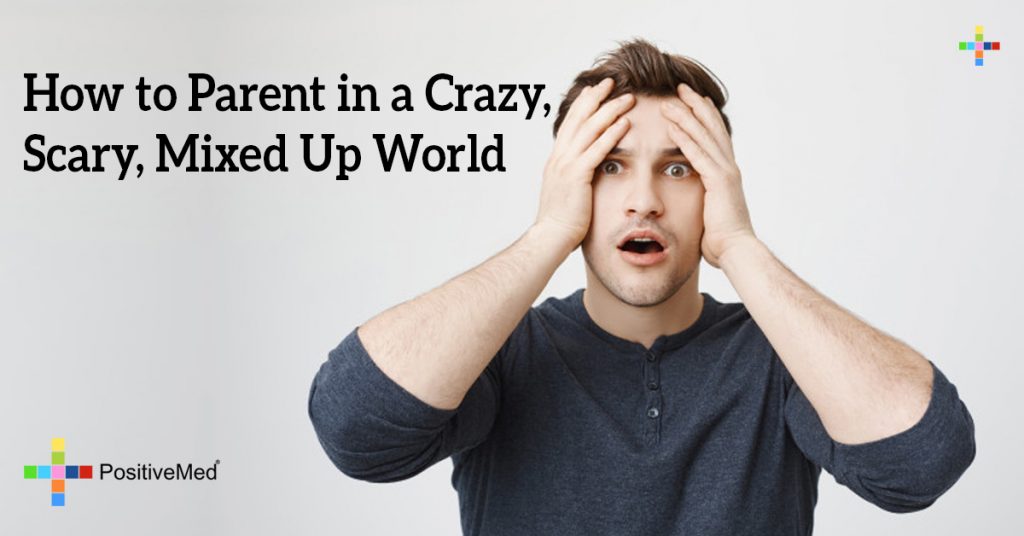
How to Parent in a Crazy, Scary, Mixed Up World
Receiving the news about the Connecticut school shooting this week was bone chilling and heartbreaking. Parents everywhere ran to hug their own children while feeling grief and pain for the parents of the school children, myself included. The world does not feel like a safe place when we cannot even expect that our elementary school aged children to be safe receiving an education.

It is overwhelming to add another fear to the anxious mix that parenting brings. How can you focus on doing work during the day when your mind reverberates with news stories of small children brutally murdered? Especially when your own children are in a classroom very similar to the one these dear babies were in. It can feel like the world is closing in on you, and like there are threats everywhere if you allow your thoughts to have their way.

In order to regulate your emotions, I urge you to notice when your thoughts wander towards “rehearsing” a stressful scenario in your mind. When you play the movie of all the horrible things that could possibly happen in your mind, it affects your body as well. The anxious thoughts trigger a hormonal cascade that can serve to put you on “high alert”, inducing a state of hypervigilence that can be very uncomfortable, not to mention bad for your body. Being in this state is like idling a car on high for long periods of time. It depletes your adrenal glands and leaves you exhausted. Thought stopping is a technique that can be helpful with this. Every time you notice an anxious thought, use it as a signal to name three things you are grateful for, immediately converting that energy of anxiety, to a higher vibrational energy of appreciation. Learning to stop these thoughts is a discipline, but it is worth the effort.
Practicing mindfulness is beneficial, especially during times of uncertainty. Focusing on the moment, being really present with your children, is the path to mindfulness. If you find you are feeling anxious, really focus on their faces, as if you were seeing them for the first time. Look deeply into their eyes, and notice how beautiful they are, looking at their eyelashes one by one. Really tune in to their voices and notice the cadence and intonation. Pay attention to how your body feels in their presence. Breathe.
Your children feed on your energy, so at stressful and tragic times like this, it is important for you to take care of yourself emotionally so you do not inadvertently give off any messages that your children are not safe that may cause them to fear. It is the temptation to ignore the children while watching the news and to have conversations in front of them that may be anxiety producing . Making sure that your children are not exposed to a constant influx of traumatic images coming into your home via the television or radio or conversations about the news stories is one way you can protect them. Having other adults to discuss your feelings with about the tragedy outside of your children’s presence can go a long way towards helping you maintain emotional regulation in the presence of your children and protecting them from adopting your anxiety and pain vicariously.
Reassure your children that they are loved and that you would do anything to keep them safe. They need to hear these words in uncertain times. They may also need to understand and grieve, just like you. Playing a game where you start by asking them to draw pictures of ordinary things and life events, eventually allowing them eventually draw pictures of what they have heard or seen can help them process their feelings.
Watch your children for signs of trauma, such as manic activity followed by periods of sitting and staring into space. If you notice nightmares or unrealistic or unfounded fears, talk to your child, if they do not subside, then seek a qualified mental health professional to assist your child in processing the trauma.
Talk to your children about what happened, reframing the events to help them see that there is still good amidst the evil. I love the precious words of Fred Rogers, who touched on the topic of tragic events in the news in his book “The Mister Rogers Parenting Book,” the last book he worked on before he died in 2003. In fact, his own mother’s words helped him make some sense of tragic events.
“When I was a boy and I would see scary things in the news, my mother would say to me, ‘Look for the helpers. You will always find people who are helping,'” he wrote. “To this day, especially in times of ‘disaster,’ I remember my mother’s words and I am always comforted by realizing that there are still so many helpers – so many caring people in this world.”
I would like to leave you with some more wisdom from Mr. Rogers:
Even if we wanted to, it would be impossible to give our children all the reasons for such things as war, terrorists, abuse, murders, major fires, hurricanes, and earthquakes. If they ask questions, our best answer may be to ask them, “What do you think happened?” If the answer is “I don’t know,” then the simplest reply might be something like, “I’m sad about the news, and I’m worried. But I love you, and I’m here to care for you.”
If we don’t let children know it’s okay to feel sad and scared, they may think something is wrong with them when they do feel that way. They certainly don’t need to hear all the details of what’s making us sad or scared, but if we can help them accept their own feelings as natural and normal, their feelings will be much more manageable for them.
Angry feelings are part of being human, especially when we feel powerless. One of the most important messages we can give our children is, “It’s okay to be angry, but it’s not okay to hurt ourselves or others.” Besides giving children the right to their anger, we can help them find constructive things to do with their feelings. This way, we’ll be giving them useful tools that will serve them all their life, and help them to become the worlds’ future peacemakers — the world’s future “helpers.”
Edited By: Ellie Aug 4th 14





